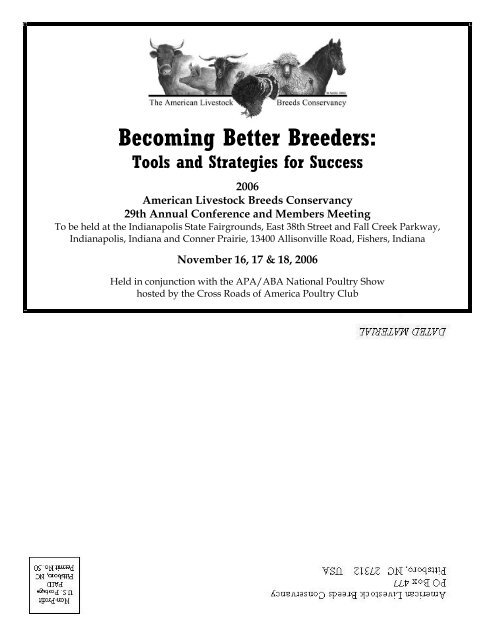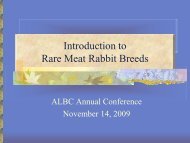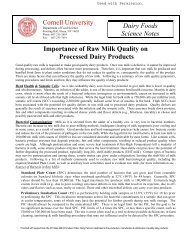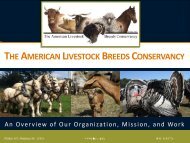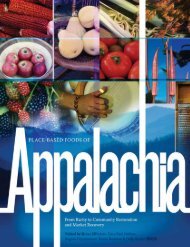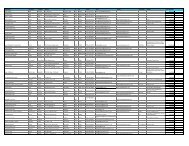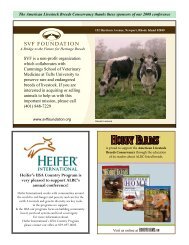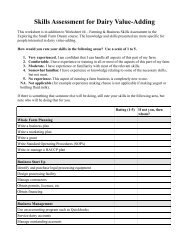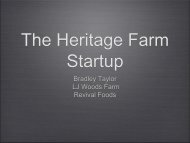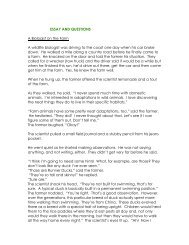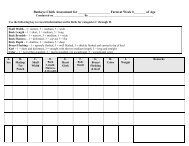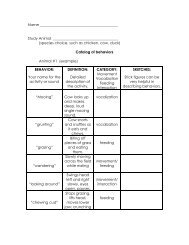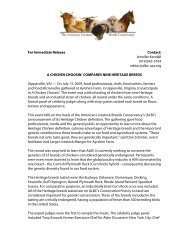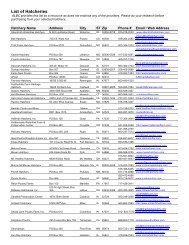Becoming Better Breeders: - American Livestock Breeds Conservancy
Becoming Better Breeders: - American Livestock Breeds Conservancy
Becoming Better Breeders: - American Livestock Breeds Conservancy
Create successful ePaper yourself
Turn your PDF publications into a flip-book with our unique Google optimized e-Paper software.
<strong>Becoming</strong> <strong>Better</strong> <strong>Breeders</strong>:<br />
Tools and Strategies for Success<br />
2006<br />
<strong>American</strong> <strong>Livestock</strong> <strong>Breeds</strong> <strong>Conservancy</strong><br />
29th Annual Conference and Members Meeting<br />
To be held at the Indianapolis State Fairgrounds, East 38th Street and Fall Creek Parkway,<br />
Indianapolis, Indiana and Conner Prairie, 13400 Allisonville Road, Fishers, Indiana<br />
November 16, 17 & 18, 2006<br />
Held in conjunction with the APA/ABA National Poultry Show<br />
hosted by the Cross Roads of America Poultry Club
Frank Reese, Jr. owns and operates Good Shepherd Ranch in Lindsborg, Kansas. Frank has raised standard varieties of turkeys<br />
since his childhood, and is currently leading the effort to conserve heritage turkeys through breeding, production collaborations with<br />
regional farms, and regional and national marketing strategies. He is dedicated to raising all of his poultry humanely on pasture and<br />
providing his customers with the highest quality turkey available. Frank also breeds chickens, ducks, and geese and has begun<br />
marketing selected breeds. In 2003 Frank received ALBC’s Bixby-Sponenberg Breed Conservation Award for his contributions to the<br />
recovery of standard varieties of turkeys. Frank also works full time as a nurse anesthetist.<br />
Glenn Drowns and his wife Linda conserve and promote rare breeds and varieties of turkeys, ducks, geese, and chickens, as well as<br />
an array of heirloom vegetables at their Sand Hill Preservation Center, in Calamus, Iowa. Glenn has raised standard turkey varieties<br />
for over 20 years, and continuously since 1989. The Drowns actively maintain populations of rare and endangered varieties of<br />
naturally mating turkeys as a resource for other conservationists. They offer information and education on the different turkey<br />
varieties and their appropriate habitats. Glenn received ALBC’s Breed Conservation Award in 1999 for his contributions to the<br />
identification and survival of rare turkeys. Glenn is also a full-time science teacher for middle and senior high students.<br />
Marjorie Bender is a Research and Technical Program Manager for the <strong>American</strong> <strong>Livestock</strong> <strong>Breeds</strong> <strong>Conservancy</strong> (ALBC). She<br />
joined the staff in January 1999. She has a M.Ed. in Agricultural Science from the University of California-Davis, has been involved<br />
in sustainable agriculture since 1991, and has over 20 years of experience in the non-profit sector. Marjorie’s responsibilities include<br />
coordinating the poultry census, promoting rare breeds into appropriate habitats, and working closely with other staff on timely<br />
conservation activities. She has led ALBC’s heritage turkey conservation effort. During her free time, Marjorie enjoys riding her<br />
Choctaw pony, a line of Colonial Spanish.<br />
Jeannette Beranger joined the ALBC team in August of 2005 and is a Research and Technical Program Manager. She comes to the<br />
organization with over 20 years experience working with animals in the non-profit sector. Beginning her career as a veterinary<br />
technician, Jeannette progressed to become a head zookeeper at the Roger Williams Park Zoo in Rhode Island. Her responsibilities<br />
included managing a wide variety of species, and in particular the animals within the rare breeds farm of the zoo. Through her work<br />
for the <strong>American</strong> Association of Zookeepers, Inc., she developed international outreach programs that included zookeeper training<br />
workshops and the first-ever international conference on zookeeping. Jeannette's experience facilitating research, organizing<br />
workshops and conferences, applying technology to improve animal husbandry, combined with her skills in outreach and networking<br />
have made her a welcome fit to research, plan, develop and implement important breed conservation programs for ALBC.<br />
Donald E. Bixby, DVM is a Technical Program Manager for ALBC. He served as ALBC's Executive Director from August 1988<br />
through July 2002, and was responsible for providing the vision and overseeing the implementation of the conservation activities of<br />
ALBC. Don has been involved with the organization since the 1980s, organizing the first North <strong>American</strong> rare breeds show and sale<br />
and establishing the ALBC Rare <strong>Breeds</strong> Gene Bank, which has expanded over the years. He has been the liaison to the USDA<br />
National Animal Germplasm Program and a leader in founding Rare <strong>Breeds</strong> International. He has overseen the livestock and poultry<br />
research, and promoted rare breeds to the sustainable agriculture community. He was honored in 2000 by Slow Food International for<br />
the work of ALBC in conserving genetic diversity in the farm animal species. In his current position as Technical Program Manager,<br />
Don is able to devote more time to technical outreach to promote sustainable integration of livestock and poultry.<br />
Don T. Schrider joined the ALBC staff in February 2004 and serves as the Communication Director. Don has nearly two decades of<br />
experience working within the visual communication and marketing fields. He brings firsthand experience of breed conservation to<br />
this position, having raised Tunis sheep and Brown Leghorn chickens for more than a decade and having served as an officer for the<br />
breed associations for these breeds. Don is author of many articles on breeding and raising chickens and writes a monthly column for<br />
Poultry Press. These attributes make him a unique fit to research, plan, develop and implement poultry related programs for ALBC.<br />
Mark J. See became a member of ALBC in 1992 and has been involved in raising ducks and geese for the past 8 years. His primary<br />
conservation effort has been with the Cotton Patch goose, after he located two relic flocks. Mark is author of The Cotton Patch Goose,<br />
which appeared on the cover of the November/December 2005 issue of the ALBC News, and which generated interest for the breed in<br />
Canada and the United Kingdom. Mark’s article was re-published in the British Waterfowl Association’s spring 2006 newsletter.<br />
Establishing additional flocks for breed conservation is the central focus of his work, which combines historical research together with<br />
modern communication and documentation.<br />
D. Phillip Sponenberg, DVM, Ph.D. has served as the Technical Coordinator for ALBC since 1978. He is a veterinary<br />
pathologist and geneticist at Virginia Polytechnic Institute and State University in Blacksburg. He has written several books on color<br />
genetics and rare breed conservation – including A Conservation Breeding Handbook and is sought after as a speaker on genetics as<br />
well as rare breed conservation. Phil has taken the lead on Spanish horse rescues and is a conservation breeder of Spanish horses, and<br />
Tennessee Fainting goats. He works closely with several breed organizations as well as individual breeders of several different breeds.<br />
Tom Walker is a retired higher education administrator with a lifelong interest in poultry. His lifetime conservation focus has been<br />
on turkeys and geese. Tom grew up on a “two-mule” farm in southwestern Arkansas during the Great Depression. During his youth,<br />
auto-sexing common geese were used by cotton farmers to weed the cotton fields of grasses and other unwanted vegetation.<br />
Approximately a decade ago, Tom began a search to find some of these “cotton patch” geese he remembered from his youth. After<br />
more than 10,000 miles of traveling in his minivan, he succeeded in acquiring one line from Arkansas, two lines from Mississippi, and<br />
three lines from Tennessee.
<strong>Becoming</strong> <strong>Better</strong> <strong>Breeders</strong> – Tools and Strategies for Success<br />
Schedule of Events<br />
November 16-18, 2006<br />
9:00 – 9:45 a.m.<br />
Fairgrounds Conference Room<br />
10:00 a.m. – 6:00 p.m.<br />
Fairgrounds Conference Room<br />
and West Pavilion<br />
The Fairgrounds does charge a<br />
parking fee – their weekend<br />
pass may be most economical if<br />
attending full conference.<br />
7:30 – 8:30 a.m.<br />
Fairgrounds – ALBC Booth<br />
9:00 – 10:00 a.m.<br />
Fairgrounds – Edy’s Grand Hall<br />
10:00 a.m. – 12:30 p.m.<br />
Fairgrounds – Edy’s Grand Hall<br />
then moving to West Pavilion<br />
Lunch – 12:30 – 1:30 p.m.<br />
1:30 – 3:30 p.m.<br />
Fairgrounds – West Pavilion<br />
3:30 – 5.00 p.m.<br />
Fairgrounds<br />
6:00 p.m.<br />
Indianapolis Marriott East<br />
Indianapolis Ballroom<br />
After Reception<br />
Indianapolis Marriott East<br />
7:45 – 8:15 a.m.<br />
Conner Prairie<br />
Fishers, IN<br />
Thursday, November 16, 2006<br />
Pre-Conference Heritage Turkey Breeder Clinic Sign-in<br />
Marjie Bender<br />
Pre-Conference Heritage Turkey Breeder Clinic<br />
Presenters: Frank Reese, Jr., Marjorie Bender<br />
The ALBC conference starts with a day-long, pre-conference Turkey Breeder Clinic, led by heritage<br />
turkey master breeder Frank Reese, Jr. of Good Shepherd Ranch in Lindsborg, Kansas. Participants<br />
will learn how to evaluate standard varieties for the conformation needed to produce healthy, viable,<br />
marketable turkeys that will reproduce naturally. Participants will have the opportunity to handle<br />
birds and develop both an understanding and a feel for evaluation points. ALBC’s Phil Sponenberg<br />
and turkey breeder Danny Williamson will be on hand to share their expertise. This is a rare<br />
opportunity; previous turkey breeder clinics have filled quickly.<br />
Friday, November 17, 2006<br />
Conference Sign-in<br />
• Pick-up nametag and conference packet<br />
• Walk-in registrations. Reception and banquet<br />
registration based on availability<br />
• Submit Silent Auction donations and Photo<br />
Contest entries. Photos become the property<br />
of ALBC unless otherwise indicated; size<br />
limit 5”x 7”.<br />
Biosecurity – Practices to Protect <strong>Livestock</strong> and Poultry<br />
Presenters: Donald E. Bixby, DVM , Jeannette Beranger<br />
Biosecurity is a management tool that can help prevent diseases from occurring in livestock and<br />
poultry. Learn the basics of disease transmission, biosecurity strategies that reduce exposure to<br />
disease, and additional measures that can be implemented during times of disease threat. Participants<br />
will receive a certificate of attendance and materials to personalize a biosecurity plan to fit their own<br />
farm. Anyone who manages livestock or poultry will benefit by attending.<br />
Judging, Selecting, and Breeding Chickens for Production<br />
Presenters: Don Schrider, Jeannette Beranger, and Frank Reese, Jr.<br />
This program will answer these important questions: How do you know if a hen is laying? Which<br />
offspring should be retained as breeding stock to improve rate of growth, size, or fleshing? Attendees<br />
will learn how to use tried-and-true techniques for evaluating the productivity of chickens. Program<br />
includes discussion and a hands-on opportunity to apply skills learned. These techniques have been<br />
successfully applied to rare Standard bred poultry lines by both Frank Reese and ALBC.<br />
Lunch on your own; food will be available at Fairgrounds vendors or off site<br />
Rare Breed Poultry Tour<br />
Join us for guided tours of the rare breeds of poultry present at the poultry show. See living examples<br />
of Nankin and Java chickens, Cayuga ducks, Pilgrim geese, Bourbon Red turkeys and others, and<br />
learn about the history and the unique characteristics of these breeds. Tour leaders will include staff<br />
and members of the <strong>American</strong> <strong>Livestock</strong> <strong>Breeds</strong> <strong>Conservancy</strong>, members of the <strong>American</strong> Poultry<br />
Association, and members of the Society for Preservation of Poultry Antiquities.<br />
Free Time To Explore Poultry Show<br />
Rare Breed Tasting Reception with Cash Bar<br />
Join ALBC for a rare breed tasting at the Indianapolis Marriott East. This will be an opportunity to<br />
sample a number of rare breeds listed on the ALBC Conservation Priority List while mingling with<br />
other rare breed stewards. Cash bar is available.<br />
Silent Auction and Photo Contest Begin<br />
ALBC Member Meeting and Member Sharing<br />
The reception will be followed by the Annual ALBC Members Meeting. Come prepared to share<br />
your experiences and stewardship successes.<br />
Conference Sign-in and<br />
Walk-in Registration for<br />
Late Arrivers<br />
Saturday, November 18, 2006<br />
Submit Silent Auction donations and Photo Contest entries to ALBC<br />
booth at Fairgrounds. Photos become the property of ALBC unless<br />
otherwise indicated; size limit 5”x 7”.
8:30 – 10:00 a.m.<br />
Conner Prairie<br />
Fishers, IN<br />
10:30 – 12:00 noon<br />
Conner Prairie<br />
Fishers, IN<br />
12:00 noon – 1:00 p.m.<br />
Conner Prairie<br />
Fishers, IN<br />
1:00 – 2:00 p.m.<br />
Conner Prairie<br />
Fishers, IN<br />
2:30 – 3:30 p.m.<br />
Conner Prairie<br />
Fishers, IN<br />
3:30 – 5:00 p.m.<br />
Conner Prairie<br />
Fishers, IN<br />
6:00 p.m.<br />
Indianapolis Marriott East<br />
Indianapolis Ballroom<br />
7:00 p.m.<br />
Indianapolis Marriott East<br />
Indianapolis Ballroom<br />
Following Banquet<br />
Indianapolis Marriott East<br />
Indianapolis Ballroom<br />
What Is a Breed? How Do Associations Help <strong>Breeds</strong>?<br />
Presenters: D. Phillip Sponenberg, Donald E. Bixby<br />
The answers to these two questions are fundamental for successful breed conservation and<br />
promotion. Learn the definition of a breed and how understanding this definition informs the<br />
decisions and activities of both breeders and breed associations.<br />
Genetic Resource Rescue – How to Save Rare <strong>Breeds</strong> and Rare Strains<br />
Presenters: D. Phillip Sponenberg, Mark See, and Tom Walker<br />
In this program you will learn the strategies used to expand small populations without the addition of<br />
outside genetics. These strategies can be applied equally to breeds, strains, or rare bloodlines. Mark<br />
See and Tom Walker have applied these strategies in the identification and rescue of the Cotton Patch<br />
goose. You’ll be better informed on this crucial aspect of breed conservation, which will help you<br />
regardless of your breed.<br />
Lunch<br />
Provided by ALBC<br />
Conservation Breeding Strategies for Rare <strong>Breeds</strong><br />
Presenters: D. Phillip Sponenberg, Glenn Drowns<br />
Learn how to manage populations in breeding groups and how to apply breeding theories to maintain<br />
the genetic integrity of the breeds you conserve. The proper application of tools such as selective<br />
breeding for productivity will be put into the larger context of conservation. Discussion will include<br />
strategies to implement when circumstances alter breeding plans.<br />
Master <strong>Breeders</strong> – Who are They, How Do I become One?<br />
Presenters: D. Phillip Sponenberg, Marjorie Bender, Donald E. Bixby<br />
While the work of many conservationists contribute to the future of a breed, a small handful of<br />
breeders dramatically affect the integrity and conservation of a breed. These stalwart breed<br />
supporters seem to have a natural affinity for the breeds under their care. Come and learn the<br />
characteristics of Master <strong>Breeders</strong>, the commitment required, and the steps needed to become one.<br />
Free Time to Tour Conner Prairie<br />
Conner Prairie is an outdoor history museum that offers a chance to encounter the past. While the<br />
museum is closed to the public during our visit, conference participants will have a chance to tour<br />
unique historic theme areas: 1886 Liberty Corner farm; 1836 Prairietown; 1823 Conner House; 1816<br />
Lenape Indian Camp; and Past-Port, their hands-on discovery area. For more information about<br />
Conner Prairie visit: www.connerprairie.org<br />
Reception with Cash Bar<br />
Silent Auction and Photo Contest conclude - Payments and pick-up due at this time.<br />
ALBC Banquet<br />
The banquet menu will feature rare breeds. This is another opportunity to taste the rich flavors of rare<br />
breeds while enjoying the company of other stewards.<br />
Keynote Address: Conservation – One Breed at a Time<br />
The Conference keynote speaker will be Glenn Drowns, owner of Sandhill Preservation Center in<br />
Calamus, Iowa, and a lifelong steward of rare poultry and heirloom vegetables. In his keynote<br />
address, Conservation – One Breed at a Time, Glenn will speak from the heart about the personal<br />
commitment and rewards of dedicating oneself to the conservation of rare breeds.<br />
Airport<br />
Accommodations<br />
Attendees are responsible for arranging their own transportation and accommodations.<br />
Indianapolis International. Travel distance to motels is 12.9 miles and to the Fairgrounds is 14.45 miles.<br />
Indianapolis Marriott East, 7202 E 21st Street, Indianapolis, IN 46219 is the headquarters hotel and will be the<br />
site of an ALBC Friday Reception and Saturday night ALBC banquet. 1-800-228-9290 or 1-317-352-1231<br />
NOTE: All rooms at the Marriott are sold out for this event.<br />
Because of the large number of attendees at the upcoming Poultry Show, most of the motels near the show site<br />
are already full. If you have not already made your reservations, contact the Indianapolis Convention and Visitors<br />
Association (1-800-824-INDY or icva@indianapolis.org or www.indy.org ) for a list of motels in the surrounding<br />
area to help you find one that has rooms available.<br />
ALBC PO Box 477 Pittsboro, NC 27312 919-542-5704 Fax: 919-545-0022<br />
E-mail: albc@albc-usa.org Web: www.albc-usa.org
The 29th Annual Conference of the <strong>American</strong> <strong>Livestock</strong> <strong>Breeds</strong> <strong>Conservancy</strong><br />
<strong>Becoming</strong> <strong>Better</strong> <strong>Breeders</strong> – Tools and Strategies for Success<br />
November 16-18, 2006<br />
Please join the <strong>American</strong> <strong>Livestock</strong> <strong>Breeds</strong> <strong>Conservancy</strong> (ALBC) for a number of workshops designed to give current and<br />
future stewards of livestock and poultry the tools to successfully manage breeding populations.<br />
Fee Structure (per Attendee) - Please use the letters A, B, C, D to indicate which participant is registering for which activities.<br />
Full Conference Package (includes Friday and Saturday meetings, and Reception and Banquet)<br />
ALBC/APA/ABA Members $125.00 Registrant A B C D (Please circle all that apply)<br />
Non-Members $155.00 Registrant A B C D (Please circle all that apply)<br />
Thursday Pre-Conference Turkey Breeder Clinic (not included in Full Conference Package price)<br />
Also Attending Full Conference $50.00 Registrant A B C D (Please circle all that apply)<br />
Not Attending Full Conference $75.00 Registrant A B C D (Please circle all that apply)<br />
Friday Reception only $25.00 Registrant A B C D (Please circle all that apply)<br />
Saturday Reception and Banquet only $50.00 Registrant A B C D (Please circle all that apply)<br />
Registration Deadline is November 1, 2006<br />
Please Print:<br />
Name (A) ______________________________________<br />
Name (B) ______________________________________<br />
Name (C) ______________________________________<br />
Name (D) ______________________________________<br />
Total per attendee:<br />
$______________<br />
$______________<br />
$______________<br />
$______________<br />
Grand Total:<br />
$_________________<br />
Address to which you would like the conference registration certification and information mailed:<br />
Address __________________________________________________________________________________________________<br />
City _________________________________________________________ State ___________ Zip_________________________<br />
Telephone (day) __________________________________E-mail ___________________________________________________<br />
Payment:<br />
Total Enclosed: $________________________________ Check Credit Card (Visa/MasterCard only)<br />
Account # ___________________________________________________________ Exp. Date: ___________________________<br />
V-code: __________(last 3 digits on back of card) Name on Card: __________________________________________________<br />
Billing Address (if different from mailing address above):<br />
Address __________________________________________________________________________________________________<br />
City _________________________________________________________ State ___________ Zip_________________________<br />
Return completed form with payment to: ALBC Conference PO Box 477 Pittsboro, NC 27312<br />
If you have any questions contact us: Phone: 919-542-5704 Fax: 919-545-0022 E-mail: albc@albc-usa.org<br />
Registrations paid by credit card may be submitted by fax, phone or e-mail. Registration forms also available online: www.albc-usa.org.<br />
Attendees are responsible for arranging their own transportation and accommodations.
The <strong>American</strong> <strong>Livestock</strong> <strong>Breeds</strong> <strong>Conservancy</strong> would like to thank these<br />
sponsors of our 29th Annual Conference and Members Meeting<br />
Heifer’s USA Country Program is<br />
very pleased to support ALBC’s<br />
annual conference!<br />
Heifer International works with communities around<br />
the world to end hunger and poverty and care for the<br />
earth. <strong>Livestock</strong> and genetic diversity are key tools<br />
in the programs we support.<br />
In the USA our programs focus on building communitybased,<br />
just food systems and food sovereignty.<br />
For more information about<br />
Heifer International’s USA Country Program<br />
please contact our office at 859-497-0603.


